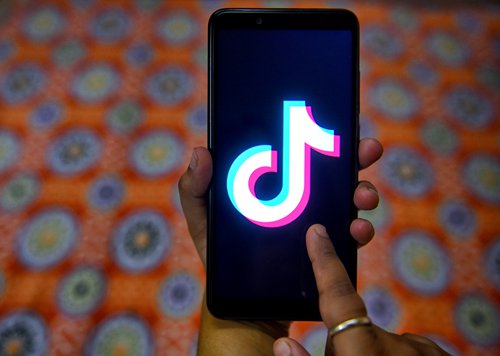SOURCE / INDUSTRIES
Indians worry Chinese app ban could result in job losses, reduced communication

The image of TikTok in India. Photo: IC
India's ban on 59 apps developed by Chinese companies may have a larger impact than the government wagered, as many locals have expressed their concerns within days of the ban's announcement.
From Indian students to businesspeople, and from online celebrities to IT talent, Indian users of these apps are waiting anxiously to see how the ban will be implemented and what impacts they will suffer.
Immediately after the ban was announced on Monday night, the Zakaria family in India called their son who is in Beijing via WeChat, the most popular chat app in China which was developed by Tencent.
"As of now, I don't have any problem using this app and my family and friends are not having any problem using this app in India. But I don't know, in the future will this app be completely banned? If so, how would I communicate with my family?" asked Zakaria, who has lived in China for three years, in an interview with the Global Times on Wednesday.
The list of banned apps includes multiple video platforms, which will critically strike local online celebrities who became superstars by posting videos on them. TikTok has been removed from the Google and Apple Indian app stores, according to Reuters. Last year, the TikTok's parent company ByteDance decided to invest $1 billion in India as the country had become its biggest overseas market with more than 600 million downloads.
"This is a man-made crisis," Zakaria said of the ban. "Especially after the coronavirus, India's economy is already heading downward. There are already mass numbers of jobs being cut."
He expressed strong concerns for the online celebrities who are dependent on these Chinese apps.
"In the short term, it will definitely affect these people's livelihoods, their jobs and their income source," Zakaria noted, adding that if the Chinese companies have to retreat from India in the future, it would mean a loss for Indian people as some of them will lose their jobs.
TikTok user omkarsharma988 posted a video to express his dissatisfaction with the ban, according to Reuters. In the video, he throws utensils to the ground, hits a chair and weeps, singing the lyrics of a Hindi song, "You've left me, how will I live now?" according to the report, which noted the video had received 218,000 likes as the app still works on phones if it was downloaded before the ban came into force.
For those living in India with direct connections to China, their concerns are not groundless.
An Indian university student told the Global Times on Wednesday that she is worried the ban will affect her job search.
"I use WeChat and some Chinese apps to practice the Chinese language. Though it doesn't affect my life much as WeChat is still functioning now, in the future it will exert an influence on my study and job hunting," she said.
The student has been learning Chinese for four years and plans to seek a job connected with China.
"I am concerned that I can't talk to my Chinese friends. It will also affect my job hunting," she said.
However, the ban may give rise to a variety of solutions for Indian users to continue using the apps, as some need to do so.
An Indian logistics service provider based in Yiwu, East China's Zhejiang Province, told the Global Times on Wednesday on the condition of anonymity that his business partner, who is based in New Delhi, is planning to buy a new mobile phone from China in order to use the banned apps. That is because the businessman doesn't intend to give up the Chinese market, in which Chinese apps are necessary for communication.
Tarun Pathak, an analyst at research firm Counterpoint, said the ban would impact roughly one in three smartphone users in India, TechCrunch reported on Monday.
The ban will harm a lot of Indian people whose lives depend on these apps, Zakaria said.
"Every country should focus on developing their own goods and market, but before the government bans foreign goods or foreign exports, does it have sufficient resources to develop its own goods or home-grown apps? Do we have the alternatives? At the moment, we don't," Zakaria said.



